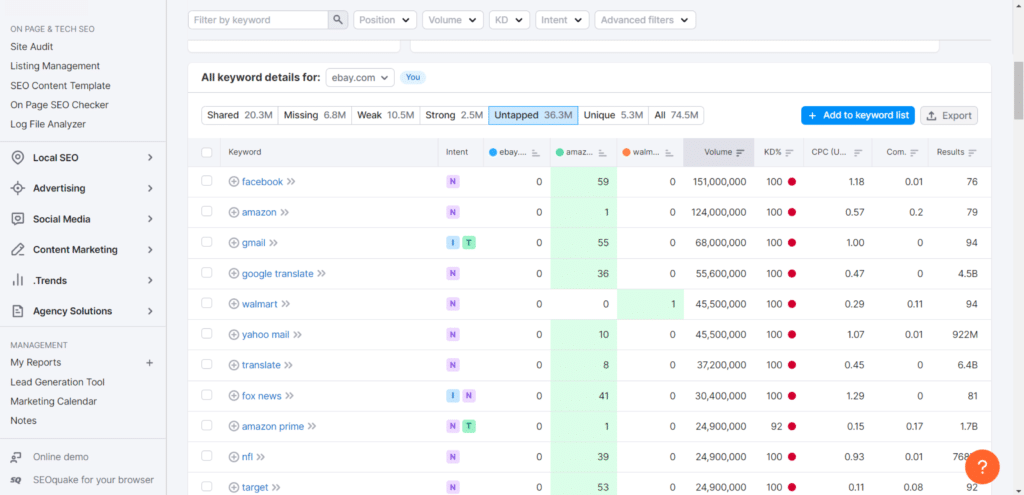Outrank Your Competitors in Organic Search with Semrush Competitor Keyword Analysis
If you’re wondering how to outrank your organic competitors in Google search results, then you need to know how to perform competitor keyword research. This could be easily done using the competitor keyword research toolkit provided by Semrush. These tools use keyword data to help you identify which competitor keywords are boosting their rankings; what type of content they have created to include these target keywords; and how their organic search rankings change over time as they experiment with different keywords.
Keep reading to learn how to use the Semrush competitor keyword research tools to outrank your rivals, bring more traffic to your website, and increase your sales.
What Are Keywords?

Keywords are the most commonly used search terms when people use a search engine like Google to find answers to their questions. If you’re a company or brand that is knowledgeable about the question or topic, you have an opportunity to provide value by creating content that answers those questions. By including relevant keywords that generate the most organic traffic within your content, you can make it easily discoverable by the people that search for it. By using such search engine optimization (SEO) methods, you’ll also be raising awareness for your brand and attracting potential customers to your website.
What Is Keyword Research?

Keyword research is all about identifying what the best keywords are. Keyword research tools allow you to search for a particular keyword and receive useful keyword data like keyword difficulty, monthly search volume (MSV), or search intent based on how that keyword is being used online. You can even find keyword data on related keywords that you may have never even considered, helping you generate fresh keyword ideas and creative content.
By comparing keyword difficulty and monthly search volume across these keywords, you can identify the most important target keywords that will take your content to the top of the search engine results pages (SERPs) and increase your brand’s visibility online.
What Is Competitor Keyword Analysis?

Doing keyword research is a vital part of any SEO strategy to provide valuable content that your target audience is interested in and draw them in towards your brand. Keeping this in mind, it would be useful to supplement your keyword research findings with a competitive keyword analysis. Here, you’re trying to identify who your main competitors are in your industry niche, what keywords they’re using to rank, and how much success they’re having in this competitive landscape.
This type of keyword competitive analysis will help you understand why your competitors are doing better than you in the SERPs. By identifying competitor keywords that are allowing them to rank highly in search results, you can pinpoint relevant organic keywords that you could be using. If these organic keywords are relevant to your business or the search intent of your target audience, you will be able to use them strategically in your content. By using competitive keyword research, you can create content that outranks your competitors in search results. It is through competitor keyword research that you can gain a competitive edge in attracting organic traffic to your website.
Before you start diving into competitor analysis, it might be worthwhile to also learn about the purpose behind why people are searching online (search intent) and the organic value of relevant keywords in your industry niche. To find out how Semrush helps you with keyword research, read Perform Keyword Magic with the Best Keyword Research Tools from Semrush.
Competitor Keyword Analysis with Semrush

Semrush provides a whole range of software tools that you can use in your SEO strategy, market research, social media management, and more. Among these features is their competitor keyword analysis toolkit. These tools allow you to perform competitor keyword research, enabling you to identify who your competitors are, what target keywords and key phrases they’re using, as well as how they’re performing.
Identify Search Competitors with Organic Research Competitors Report

Your online search competitors may not be the same as those located down the same street as you. Search competitors are the websites that attempt to rank for the same target keywords or similar keywords as your website. You can find out who they are by using the Organic Research Competitors Report in Semrush.

Head over to the Competitive Research section, select Organic Research, type in your domain, and click search. By switching to the Competitors tab, you will be able to see the Competitive Positioning Map. This graph helps visualize the competitive landscape by displaying all the main organic competitors for the search domain you entered earlier. This competitive analysis is based on organic search traffic and the keywords they use, which have landed them in the Google Top 20 organic search results.
Moving down, you will notice a list of websites sorted by competition level. The more ranked keywords your competitors have, and the more you have in common with them, the greater the competition level will be. Here you will be able to identify who your biggest competitors are and the amount of traffic they bring in organically. You will also see the number of common keywords you share with them and even the number of paid keywords used in Google Ads.
Understand Your Competitor’s Strategy with Position Changes

By clicking on one of your competitors in the Organic Research Competitors Report, you get an overview of that specific competitor. Here, Semrush has provided plenty of widgets like the Top Organic Keywords, Organic Keyword Trends over time, and the number of keywords sorted by search intent. These are useful, but the best place to analyze their keyword strategy is to look at the Position Changes tab.
Semrush will display a graph that indicates how your competitor’s rankings on Google have changed over time. By clicking on the spikes, you will be able to identify the organic keywords that caused the rankings to improve or decline.
Sorting the graph to show ‘New’ and ‘Improved Keywords’, could reveal a change in your competitor’s content strategy. You can even view their monthly search volume, the keyword difficulty, and how the traffic changed over a specified period of time. ‘Lost’ and ‘Declined’ keywords may give you an indication of where your competitors lost their rankings. You can keep these in mind as opportunities you can take advantage of when creating content.
Which Type of Content Is Most Successful with Pages Report

By clicking on the Pages tab, you can identify which type of content created by your competitor is the most successful in search results. Your competitor’s best ranking URLs will be listed here based on the percentage of traffic brought in by organic search and the number of keywords they have ranked for.
You can sort competitor keywords by search intent or any of the available metrics. The best part is that Semrush has provided clickable URLs, which make it super easy to visit each page and study its contents. This is a great way for you to understand how your competitors have utilized keywords, the topics they focused on, and how they structured their content to attract readers.
There is even a handy Backlinks feature that acts as a shortcut to the Semrush Backlink Analytics tool. For more on backlinks, check out Competitor Backlink Analysis with Semrush.
Learn Where You’re Falling Behind with Keyword Gap

Now that you know which competitor keywords are the most successful at boosting their rankings, you might also want to know which of these competitor keywords you’re currently missing out on. This is where the Semrush Keyword Gap feature comes in. Using this competitive analysis tool, you can enter up to five domains, including your own, to compare. The competitor keyword research data that Semrush will bring to your attention will be categorized as ‘Shared’, ‘Missing’, ‘Weak’, ‘Strong’, ‘Untapped’, and ‘Unique’.
‘Shared’ is the same keywords used by all the domains. ‘Strong’ will show where you’ve ranked ahead of the competition, and ‘Unique’ will show where only you currently have a ranking. ‘Missing’ indicates the keywords that your competitors are all using with the exception of you, and ‘Weak’ shows where you’re ranking lower than your competitors. ‘Untapped’ will show keywords that at least one of your competitors is using, but not you.
Find Keyword Opportunities

Now that you have retrieved all this competitive keyword research data, it’s time to organize it and focus on what’s actually useful to you. If your website is still new, set aside those highly competitive keywords with high keyword difficulty for later. Competitor keyword research can also bring up all sorts of related keywords that may not be relevant to your business or industry niche even though they’re used by rivals. Set aside those as well, and focus on the relevant keywords.
Keyword Gap analysis combined with advanced filters provided by Semrush is a great way to plan your future content and decide what organic keywords you need to target. By performing some on-page SEO, improving the content, and internal linking, you may be able to turn those weak keywords into strong ones. Untapped and missing keywords could also be potential gold mines, providing fresh keyword ideas that will boost your rankings in organic search. Keywords recently lost by your competitors may also provide opportunities for you.
Any keywords you wish to use later can be saved in the Keyword Manager in Semrush for use later.
Pay Attention to Competitor Analysis of Advertising Research

Now that you’ve done your keyword research for organic search, it might be time to check out what your competitors are doing in paid search with Google Ads. With Semrush Advertising Research tools, you can get a competitor analysis of the top paid competitors listed by their competition level. You can view how much traffic Google Ads is sending to their domains, the number of keywords they’re buying to run Pay-Per-Click (PPC) ad campaigns, and more.
Heading over to the Ad Copies section will reveal how it will appear on Google Ads. This could be expanded to show what keywords will trigger this ad to show on search engine results pages. Additional information such as which type of ad block, search volume, and the amount paid by advertisers when the keyword triggers the ad is also provided.
By heading to the Positions tab, you can get a comprehensive list of these paid keywords with plenty of advanced filters that allow you to focus your attention on the most affordable and least competitive keywords for your advertising plans.

Get Your Competitor Keyword Research Done With Semrush

Competitor keyword analysis can reveal clues to what competitor keywords are helping them rank high in Google search results and drive traffic towards their websites. By using this information, you can get an idea of which target keywords you’re not currently using and which types of content could potentially attract more organic traffic.
You can even identify your rival’s weak points and get a competitive edge by outranking them for specific keywords. Semrush is the provider for all things related to competitor keyword research, and you can learn more about their services at Semrush Keyword Research.
How do I find competitor keywords for SEO?
You can find competitor SEO keywords by using Semrush’s Organic Keyword Research Tool. Simply put in your competitor’s website URL and Semrush will show you the keywords your competitor is ranking for. You can also use the Semrush Keyword Gap Tool to compare your own website with your competitors and find keyword opportunities for your website.
How to do Competitor Keyword Analysis in Semrush?
Use Semrush to analyze your competitors’ SEO keywords:
➥ Identify search competitors with the Organic Research Competitors Report
➥ Understand your competitor’s strategy with Position Changes
➥ Find which type of content is most successful with the Pages Report
➥ Learn where you’re falling behind with the Keyword Gap tool
